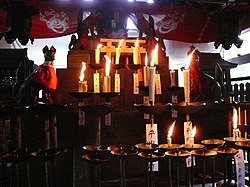Ethnic religion

In
Terminology
A number of alternative terms have been used instead of ethnic religion. Another term that is often used is
In Western contexts, a variety of terms are also employed. In the United States and Canada, a popular alternative term has been nature religion.[6] Some neopagan movements, especially in Europe, have adopted ethnic religion as their preferred term, aligning themselves with ethnology. This notably includes the European Congress of Ethnic Religions,[7] which chose its name after a day-long discussion in 1998, where the majority of the participants expressed that Pagan contained too many negative connotations and ethnic better described the root of their traditions in particular nations. In the English-language popular and scholarly discourse Paganism, with a capital P, has become an accepted term.[8]
Usage
Ethnic religions are defined as religions which are related to a particular ethnic group, and often seen as a defining part of that ethnicity's culture, language, and customs.
Some ancient ethnic religions, such as those historically found in pre-modern Europe, have found new vitality in
List of ethnic religions
See also
- Animism
- Ancestor worship
- Chinese ancestral worship
- Endogamy
- Ethnoreligious group
- Gavari
- Judaism
- National god
- Shamanism
- Slava (tradition)
- Totemism
References
- ISBN 978-0-19-062171-1.
- ISBN 9780415090124. Archivedfrom the original on 2023-10-16. Retrieved 2021-12-28.
- ISBN 978-0-191-72722-1.
- ISBN 0-415-31771-1, p. 11. Last accessed July 2009.
- ISBN 978-1-904671-71-8.
- ISBN 9781851096084.
- ^ Strmiska 2005, p. 14.
- JSTOR 10.1525/nr.2005.8.3.7. Archived(PDF) from the original on 2021-08-14. Retrieved 2019-06-29.
- ^ Oduah, Chika (19 October 2011). "Are blacks abandoning Christianity for African faiths?". theGrio. Archived from the original on 9 November 2021. Retrieved 27 May 2016.
- ISBN 978-0-195-36964-9.
- JSTOR 3711911.
- ISBN 9781848853300. Archivedfrom the original on 16 October 2023. Retrieved 17 October 2020 – via Google Books.
- ISBN 9781593337452.
- ISBN 9780313321092.
- ISBN 9781317464006.
